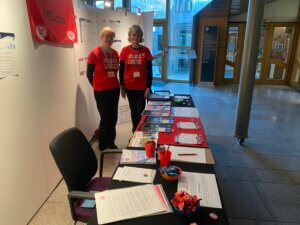This article was first published on Medium.
We are some of the subjects of the recent Netflix docuseries, Afflicted.
We were all told that we would be participating in a project that would show our lives and our struggles with illness through a “compassionate lens.” We participated because our diagnoses are misunderstood and stigmatized. We thought that revealing some of the most intimate moments of our lives would lead to greater public understanding. We hoped that with it might come investment in research to find biomarkers and better treatments. We never fathomed that we were participating in a project that would instead expose us and our communities to further ridicule and disbelief.
The most serious and central flaw of Afflicted is the way it frames our conditions — which impact millions of people around the world — as psychosomatic or psychiatric disorders. It does this in part by carefully excluding facts, which show that yes, while there is a lot that science does not understand about our conditions, they have an “organic” basis.
Scientists with deep knowledge of the research literature — including several from the Open Medicine Foundation’s “Community Symposium on the Molecular Basis of ME/CFS” at Stanford, which the film crew did shoot — were either not interviewed or their interviews ended up on the cutting room floor. Instead, Afflicted frequently relies heavily on the skeptical voices of “experts” who have no relevant professional or academic expertise in our diseases.
Many of our concrete diagnoses and test results are excluded from the series. Our conventional medical doctors were not consulted during filming. Even our own skepticism about some of the alternative treatments we pursued (sometimes with the help or at the suggestion of the production company) was carefully edited out, all to craft the most sensationalist narrative possible. The damage to each of us personally and to our communities collectively is difficult to overstate and is ongoing, even as we write this post.
Since the film’s release it has been said, many times, by many viewers, that our problem is in our heads, that we can’t accept that we need mental help. Unbeknownst to these viewers, most of us have been referred to psychiatrists at some point in our illness and yet we’re still sick. This happens commonly to patients who doctors are unable to diagnose. Many of us out of desperation have even tried antidepressants, anti-anxiety medications or other psychiatric or psychological interventions. They did not work. Mental illness is serious and devastating, and were that an explanation for our symptoms, we would gladly pursue treatment. We have all seen psychiatrists or psychologists, and have never been told that our physical symptoms have a psychiatric cause.
So, in order to start to undo some of the damage done and set the record straight, we each wrote about our experiences with the process of shooting the film, as well as the most egregious errors, manipulations and omissions of the edit. We will have more to say in the coming days and weeks regarding what action we hope Netflix will take to remedy this situation, and how you can help support us.
Here are our true stories:
Read Jamison: “I feel like this is an unjust outcome that needs to be brought to the public’s attention.”
Read Jesse and Nick’s essays, with Bekah: “We agreed to participate…because we were assured it would faithfully tell her story”
Read Jake’s story: “The question that could and should have been answered”
Pilar’s story is coming soon.
Read Jill: “I am not mentally ill or unstable. I suffer from organic illnesses caused by our toxic modern world.”
Read Janine: “I’m an editor. I always said I would never get on camera because I know what happens to people who do.”
Clockwise from left: Pilar, Jill & Janine, Jamison, Jesse & Bekah, Jake







2 thoughts on “The Truth Behind Netflix’s "Afflicted"”
I have not seen “Afflicted”, and don’t think I want to. They tell you they’re making the series to help people see you through a “compassionate” lens; but instead, they edit things out of context, and conveniently omit any & all medical & scientific facts surrounding these conditions. There is a HUGE difference between having compassion for someone and feeling sorry for them, and I believe this docu-series is promoting the latter. What they did to you guys, and all sufferers of these types of illnesses, is the ultimate betrayal and beyond unforgivable. With that, I want to thank you all for taking the initiative to set the record straight, and I hope your (real) stories go viral! Take care <3
Yeah when i watched this series I started to see a pattern in the way the story was being told and how it made the people seem like it was all in their heads. I went online and read the view of bekahs brother and saw just how wrong the series was. I know first hand how quick doctors can be to call you crazy. I have stage 4 cirrhosis, crohns disease, ascites, portal hypertension, autoimmune hepatitis and had west nile virus. Before I was diagnosed doctors were quick to say I was faking it and to get mental treatment. I was even denied at the ER when i was in the middle of west nile because they thought my shaking was because of drugs.
Comments are closed.